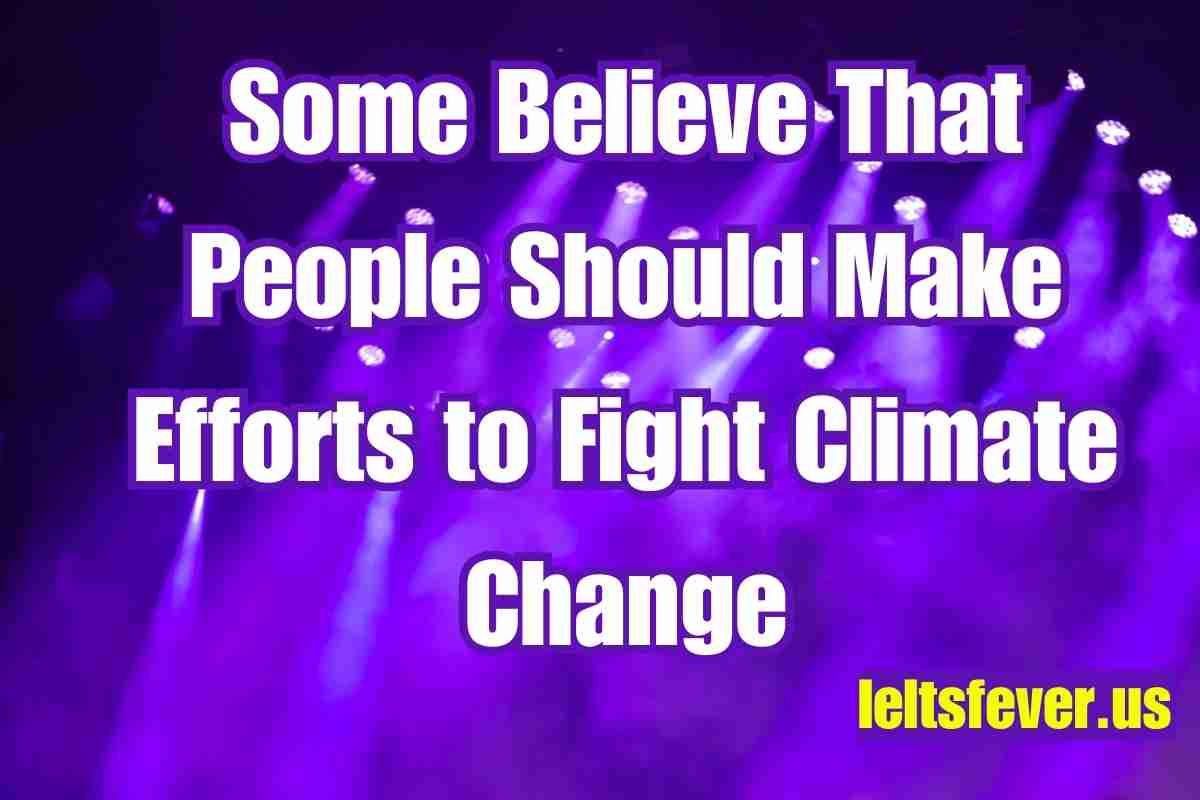Some Believe That People Should Make Efforts to Fight Climate Change while others think it is better to learn to live with it. Discuss both views and give your own opinion.
Sample 1 Some Believe That People Should Make Efforts to Fight Climate Change
In recent years, the topic of climate change has become a critical issue for people around the globe. There are two main perspectives on how to approach this challenge: one that advocates for taking action to combat climate change, and another that suggests learning to adapt to its consequences. In this essay, I will discuss both views and present my own opinion on the matter.
On one hand, many argue that it is essential to take immediate and decisive steps to combat climate change. They contend that since human activities, such as the burning of fossil fuels and deforestation, are the primary drivers of climate change, it is our responsibility to mitigate these impacts by reducing greenhouse gas emissions. This can be achieved through the adoption of renewable energy sources, such as solar and wind power, and by promoting energy efficiency in buildings and transportation. Furthermore, these advocates assert that by implementing policies and regulations that incentivize sustainable practices, we can not only decrease the effects of climate change but also create new job opportunities and stimulate economic growth.
On the other hand, there are those who believe that learning to live with the consequences of climate change is the most pragmatic approach. They argue that since the effects of climate change are already evident, it is unrealistic to expect that we can completely reverse the damage done to the environment. Instead, they propose that we should invest in strategies to adapt to the changing climate, such as constructing more resilient infrastructure, developing drought-resistant crops, and improving coastal defenses to protect against rising sea levels. These individuals contend that by focusing on adaptation, we can better prepare ourselves for the challenges that lie ahead and minimize the adverse impacts on our communities and economies.
In my opinion, while adapting to the consequences of climate change is certainly necessary, it should not be viewed as a substitute for efforts to combat it. Climate change has far-reaching and potentially catastrophic effects, and taking action to mitigate its causes is crucial for the preservation of our planet and the well-being of future generations. Although it is true that we cannot completely reverse the damage already done, we can still significantly reduce the severity of the impacts if we act collectively and decisively.
In conclusion, while both combating climate change and learning to live with its consequences have their merits, I believe that a combination of these approaches is the most effective solution. By simultaneously working to reduce greenhouse gas emissions and investing in adaptation strategies, we can create a more sustainable future for ourselves and the generations to come.
Sample 2 Some Believe That People Should Make Efforts to Fight Climate Change
Climate change has emerged as one of the most pressing issues facing humanity today. There are two primary schools of thought concerning the approach towards this challenge: one advocates for battling climate change, while the other recommends learning to adapt to its effects. In this essay, I will discuss both perspectives and offer my own viewpoint on the matter.
On one side, many individuals assert that it is crucial to take action against climate change. They believe that since human activities, such as deforestation and the burning of fossil fuels, have significantly contributed to this global crisis, it is our responsibility to mitigate these impacts by reducing greenhouse gas emissions. This can be accomplished through the adoption of renewable energy sources, like solar and wind power, as well as promoting energy efficiency in transportation and construction. Proponents of this view argue that implementing policies and regulations that encourage sustainable practices can not only minimize the effects of climate change but also stimulate economic growth and create new job opportunities.
Conversely, some people believe that it is more pragmatic to learn to live with the consequences of climate change. They argue that since the impacts of climate change are already being felt, it is improbable that we can fully reverse the damage inflicted on the environment. Instead, they suggest investing in adaptation strategies, such as building more resilient infrastructure, developing drought-resistant crops, and enhancing coastal defenses to guard against rising sea levels. By focusing on adaptation, these individuals maintain that we can better prepare for future challenges and reduce the negative impacts on our societies and economies.
In my opinion, while adaptation to climate change is undoubtedly necessary, it should not supersede efforts to combat its root causes. Climate change poses severe and potentially catastrophic consequences, and it is imperative to act collectively and decisively to mitigate its effects for the sake of our planet and future generations. Although reversing the damage entirely is unattainable, we can still significantly reduce its severity through joint efforts.
In conclusion, a combination of fighting climate change and learning to live with its consequences is the most effective solution. By simultaneously working to decrease greenhouse gas emissions and investing in adaptation strategies, we can pave the way for a more sustainable future for ourselves and generations to come.

